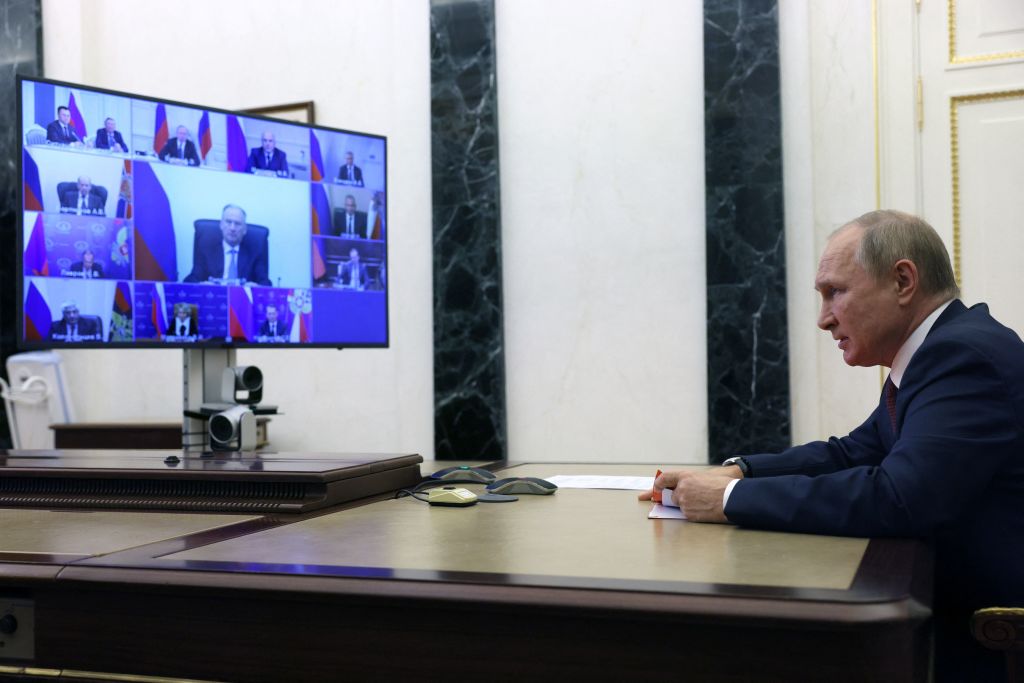Sergei Melikov, head of the Dagestan Republic within the Russian Federation, is hardly a dissident. As Colonel General Melikov, he was deputy head of the National Guard, the main militarised internal security force, and he has been a loyal agent of Moscow’s all his life. Nonetheless, he has become a no-doubt-temporary phenomenon on social media for his abusive diatribe against over-enthusiastic military recruiters.
Draft officers had been driving round Derbent, Dagestan’s second city, loudspeakers blaring calls for every adult male to go straight to their local military commissariat. ‘Utter nonsense’ was about the most polite thing Melikov had to say about this ridiculous (and illegal) gambit. He even implied that draconian new laws against spreading ‘fake news’ about the military could be used against the officials in question.
This is how autocracies often end, not with a loud bang but with quiet defections
This incident demonstrates how bureaucratic inertia and a culture of meeting quotas as quickly and easily as possible has turned partial mobilisation into a crisis. Defence minister Sergei Shoigu wanted 300,000 of the best recent draftees, especially those in their mid-20s, fit and with their training still fresh. The Kremlin’s political technologists wanted to avoid compounding existing discontents. Neither got their wish.
Instead, the mobilisation has been crass and indiscriminate: men with medical problems or who never even did national service swept up equally. The burden has fallen especially heavily on poorer regions (such as Dagestan) which, because a lack of other opportunities had made military service more appealing, had already suffered most from the war.
With mobilisation, Putin has already broken his social contract with the Russian population which, crudely put, was ‘let me have my war, and I will make sure life will not really change for most of you’. However, he is also breaking another with his local officials.
They are, after all, in a complex situation. Agents of a distant and demanding centre, to do their jobs, they also need some local legitimacy. They are at once the Kremlin’s foreman and the local trade union rep. In the past, the Kremlin accepted this, gave them some freedom for manoeuvre, but above all sought to avoid putting them into an impossible position.
Increasingly, this is no longer the case. Even before mobilisation, local officials were being expected to raise new ‘volunteer battalions’ (little more than mercenary formations), manage growing economic dislocations (often without help from federal funds), and champion a line that is increasingly obviously out of step with observed reality.
Some, especially those who were already bleeding local support such as St Petersburg governor Alexander Beglov, are doubling down on support for the Kremlin, abandoning any real pretence that they are anything more than Putin’s men. Others, such as Moscow mayor Sergei Sobyanin, fortunate enough to have the political and economic resources to weather the storm so far, are doing the least for the Kremlin they can get away with, and focusing on their job and their constituencies.
Most local satraps are somewhere in between, though. Lacking the loyalty or cynicism fully to become Varyagy – ‘Varangians,’ the term for outsider officials parachuted in by Moscow to discipline the locals – they are forced to tread a fine line. As with Melikov, they will address specific mistakes, while trying to pretend it is an aberration, not systemic. This is the modern version of the old conceit that nothing can be blamed on the ‘good tsar’, only the ‘evil boyars’ surrounding him.
Given the absence of a ‘good tsar’ any time soon, this strategy only works for a while. Eventually, they are faced with a choice as to whether or not to abandon their role as local representative (and lose any credibility and legitimacy). This is not just a political decision, though. We may think of them all as faceless Muscovite minions, but most are locally-born and bred, with friends and business connections in their regions.
In late Soviet times, many officials were faced with the same dilemma. In practice, long before the USSR was formally dissolved, it had already been partitioned by mutinous, self-interested (and, yes, sometimes loyal to their constituents) cabals of officials, subverting the central diktat.
This does not necessarily lead to fragmentation, and there is very little reason to believe the Russian Federation will break up (or be ‘decolonised’ as the current fad in some circles has it). Nor does it mean civil war. Rather, it means that a president all-powerful in theory, becomes increasingly less so in practice, facing a slow degradation of his state’s efficiency. This is how autocracies often end, not with a loud bang but with quiet defections.







Comments